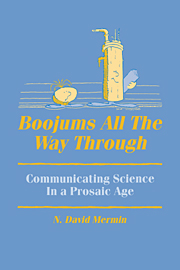Book contents
- Frontmatter
- Contents
- Preface
- I Reflections on the pursuit of physics
- II The quantum theory
- 10 Quantum mysteries for anyone
- 11 Can you help your team tonight by watching on TV?
- 12 Spooky actions at a distance: mysteries of the quantum theory
- 13 A bolt from the blue: the Einstein–Podolsky–Rosen paradox
- 14 The philosophical writings of Niels Bohr
- 15 The great quantum muddle
- 16 What's wrong with this pillow?
- III Relativity
- IV Mathematical musings
14 - The philosophical writings of Niels Bohr
Published online by Cambridge University Press: 02 December 2009
- Frontmatter
- Contents
- Preface
- I Reflections on the pursuit of physics
- II The quantum theory
- 10 Quantum mysteries for anyone
- 11 Can you help your team tonight by watching on TV?
- 12 Spooky actions at a distance: mysteries of the quantum theory
- 13 A bolt from the blue: the Einstein–Podolsky–Rosen paradox
- 14 The philosophical writings of Niels Bohr
- 15 The great quantum muddle
- 16 What's wrong with this pillow?
- III Relativity
- IV Mathematical musings
Summary
Once I tried to teach some quantum mechanics to a class of law students, philosophers, and art historians. As an advertisement for the course I put together the most sensational quotations I could collect from the most authoritative practitioners of the subject. Heisenberg was a goldmine: “The concept of the objective reality of the elementary particles has thus evaporated…”; “the idea of an objective real world whose smallest parts exist objectively in the same sense as stones or trees exist, independently of whether or not we observe them … is impossible …” Feynman did his part too: “I think I can safely say that nobody understands quantum mechanics.” But I failed to turn up anything comparable in the writings of Bohr. Others attributed spectacular remarks to him, but he seemed to take pains to avoid any hint of the dramatic in his own writings. You don't pack them into your classroom with “The indivisibility of quantum phenomena finds its consequent expression in the circumstance that every definable subdivision would require a change of the experimental arrangement with the appearance of new individual phenomena,” or “the wider frame of complementarity directly expresses our position as regards the account of fundamental properties of matter presupposed in classical physical description but outside its scope.”
I was therefore on the lookout for nuggets when I sat down to review these three volumes – a reissue of Bohr's collected essays on the revolutionary epistemological character of the quantum theory and on the implications of that revolution for other scientific and non-scientific areas of endeavor (the originals first appeared in 1934, 1958, and 1963.)
- Type
- Chapter
- Information
- Boojums All the Way throughCommunicating Science in a Prosaic Age, pp. 186 - 189Publisher: Cambridge University PressPrint publication year: 1990
- 2
- Cited by

